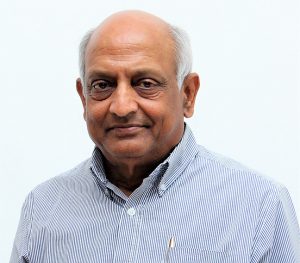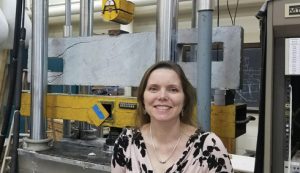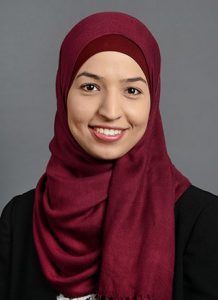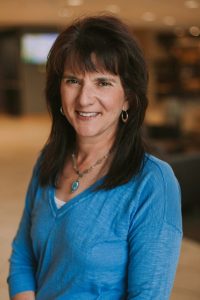January 31, 2020

CEE Professor Vellore Gopalaratnam is the principal investigator of the S-STEM project.
A five-year project that started Jan. 1, 2020 seeks to increase the recruitment and retention of high-achieving undergraduates and graduate students from low-income backgrounds to earn degrees in civil engineering. The project is funded by the National Science Foundation’s Scholarships in Science, Technology, Engineering and Mathematics (S-STEM) program. Principal investigator Vellore Gopalaratnam, a professor in the Department of Civil and Environmental Engineering, recently was awarded $959,547 by the NSF, not only to boost student recruitment and retention, but also to generate knowledge about academic success that can be shared with other higher education institutions. Co-PIs include Prof. Rose Marra, a STEM education specialist, Associate Prof. Sarah Orton, the CEE Director of Undergraduate Studies, and Tojan Rahhal, an assistant dean for inclusive excellence in the College of Engineering.
“Knowledge generation and scholarships for students are the key elements of the NSF grant, and by helping them and making sure these students are successful, we generate knowledge of what works in better educating students from low-income backgrounds in the STEM fields,” he said.
Hurdles to Success
Gopalaratnam said students from low-income backgrounds face challenges that students from more affluent backgrounds typically do not. For example, these students often come from households where both parents work, or a parent works two or more jobs to make ends meet, so the parent or parents don’t have much time to spend with their children on homework assignments and other similar support activities.
“This means they may not have the support structure in the family to be able to tackle the rigors of science and math education. They may additionally end up going to schools that are not very well funded,” he said. “Because these students are not as prepared as students from more affluent families and better school systems, frustration sets in if they cannot do well and they think engineering is not a career for them.”

CEE Associate Prof. Sarah Orton, a Co-PI on the project.
His proposal contends these low-income students are likely to do well in college provided they can master foundational courses (eight courses identified as gateway courses): courses in math, physics, chemistry, writing intensive courses and some basic science instruction. He says these gateway courses often are challenges or hurdles to student success in a STEM program.
A Holistic Approach
Beginning this fall, the first cohort of six undergraduate and two graduate students will be selected for the project. Students who meet GPA requirements and are eligible for Pell Grants will be considered for two-year scholarships. The project also will focus on first-time college students, underrepresented minorities, women and transfer students. Over the five-year project, scholarships will be provided to 24 undergraduates and 8 graduate (master’s) students. Gopalaratnam says providing academic support to these students in civil engineering is a part of the NSF proposal to boost student recruitment and retention, and a long-term CEE Department priority.
“We have partners like MoDOT, Kiewit Construction and HDR Engineering, so we will network these students with professionals so they can undertake job shadowing, internships and coop opportunities, so they can see that working hard can lead to success while giving them role models they can emulate,” he said. “We also will have them attend talks and seminars and workshops we will specially design for them to teach them the importance of time management and finance skills, to provide them the support skills to succeed in their academic and professional endeavors.”
He also hopes to impress upon the students the importance of trying to complete their degrees within a fixed time limit.

Assistant Dean for Inclusive Excellence and Strategic Initiatives Tojan Rahhal.
“Many students don’t readily realize if you finish in four years, you can get a job and become productive very soon, whereas if you take five or six years to graduate, not only are you paying more for room and board and tuition, you are missing out on the experience of professional work and earning opportunities during that extra year or two,” he said.
Gopalaratnam says his team also wants to provide numerous opportunities for these students, such as the concrete canoe contest or the steel bridge competition, to help give them a sense of belonging. He says in general, students from more affluent backgrounds feel a sense of belonging—that Mizzou is their home, whereas students from low-income backgrounds often feel as though they don’t fit in.
“We want to show them that STEM education doesn’t need to be a drudgery—it is a lot of fun,” he said. “You have fun while learning, and you have peer groups that you can relate to and work with and learn from each other. Our hope is to develop social structures within this small group that gives them a sense of identity, a sense of purpose beyond just taking the academic effort.”
Developing a Roadmap to Success
Gopalaratnam says the program focuses on freshmen and sophomores from low-income backgrounds to help them overcome the early challenges that often lead to frustration and ultimately, a change in direction. But he says it’s important to offer support to graduate students from low-income backgrounds as well because few of them pursue doctorates.

STEM Education Specialist Rose Marra, College of Education
“We would like for our own scholars to consider graduate school and for those in the graduate program to be able to go on to academic careers, so it will be more like workforce development in STEM education itself,” he said. “While we’ll have a track of students who look at the workforce in professional fields, if they have the aptitude for doctoral studies, we’d like to be able to increase that. Also, having a mixed cohort gives the undergrads role models who have already made it through the program.”
He said three project management committees have been established to implement the project: one will select students for the scholarships, one will administer the program and monitor student progress, and the other one will offer academic support and be comprised of faculty. Mizzou offices and resources for student support that already exist will be engaged for the success of scholars in the S-STEM project.
“We will look at student surveys to see what they like about our support infrastructure and what they don’t like, we’ll do our own internal evaluations on a systematic basis, and we’ll have a mandated external evaluator who will look at how well our students and our program are doing,” he said. That external evaluator, Prof. Doug Hacker with the University of Utah’s Department of Educational Psychology, will do a formative study and then a summative one at the end of the project, and that final report will be available to any other educational program that wants to try to replicate the effort.
“One of our objectives is to build an infrastructure that will remain in place after the NSF grant runs out, so our ultimate goal is to not only help these students (in civil engineering) but to help students in general who come from low-income backgrounds,” he said. “The generation of knowledge is an integral and important component, which can be sustained long after the project is over.”